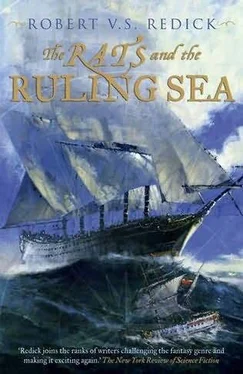Robert Redick - The Rats and the Ruling sea
Здесь есть возможность читать онлайн «Robert Redick - The Rats and the Ruling sea» весь текст электронной книги совершенно бесплатно (целиком полную версию без сокращений). В некоторых случаях можно слушать аудио, скачать через торрент в формате fb2 и присутствует краткое содержание. Жанр: Фэнтези, на английском языке. Описание произведения, (предисловие) а так же отзывы посетителей доступны на портале библиотеки ЛибКат.
- Название:The Rats and the Ruling sea
- Автор:
- Жанр:
- Год:неизвестен
- ISBN:нет данных
- Рейтинг книги:5 / 5. Голосов: 1
-
Избранное:Добавить в избранное
- Отзывы:
-
Ваша оценка:
- 100
- 1
- 2
- 3
- 4
- 5
The Rats and the Ruling sea: краткое содержание, описание и аннотация
Предлагаем к чтению аннотацию, описание, краткое содержание или предисловие (зависит от того, что написал сам автор книги «The Rats and the Ruling sea»). Если вы не нашли необходимую информацию о книге — напишите в комментариях, мы постараемся отыскать её.
The Rats and the Ruling sea — читать онлайн бесплатно полную книгу (весь текст) целиком
Ниже представлен текст книги, разбитый по страницам. Система сохранения места последней прочитанной страницы, позволяет с удобством читать онлайн бесплатно книгу «The Rats and the Ruling sea», без необходимости каждый раз заново искать на чём Вы остановились. Поставьте закладку, и сможете в любой момент перейти на страницу, на которой закончили чтение.
Интервал:
Закладка:
Darius Plapp had less to say on the matter, trusting his sonorous voice and deep-set eyes to carry the message. 'We're sailing into history,' he would announce, with a grave, portentous nod.
Sergeant Drellarek played his part as well. Amazingly, he had managed to portray the execution of one-seventh of his men as a victory for the rest. The price of greatness, he said, had always been far higher than ordinary men could understand. But Turachs were different: they were Magad's warrior-angels, they were the fine edge of the knife with which the Emperor was pruning the tree called Alifros. 'In the end this world will be a fair reflection of the Tree above us,' he told them. 'Most men would shrink from such a challenge. But not us. When Turachs pass through fire they emerge with the hardness of steel.'
These three men — Burnscove, Plapp and Drellarek — also began to talk about the enemy. This was done rather quietly, and often late at night, after one or more of them appeared unexpectedly to pitch in with a bit of labour, or to top off the men's grog with a flask produced from none-knew-where. Talk of the Mzithrinis invariably meant talk of war crimes, atrocities committed by whole legions or a bloodthirsty few.
'Little Orin Isle, now,' said Drellarek with a sigh, at one such gathering. 'That little speck of a place off the side of Fuln, with no more than three thousand men. You wouldn't think it would be worth much bloodshed to take her, now would you? Ah, but you're not thinking like a Black Rag! Orin had a fortified jetty, and strong memories of what them butchers did to their grandfathers. So they fought like tigers, and kept the Sizzies from landing for a week. The Sizzies took 'em at last, of course. And when the brave men of Orin knew they were beat, they lay down their weapons, and their leaders came forward and gave their word of honour that they'd fight no more, and asked for mercy.
'Do you know what sort of mercy they got? The Sizzies marched every man who could still walk out to a lead mine in the hills. They sent 'em underground, all chained together. And then they knocked out the roofing timbers and the tunnel collapsed.'
Drellarek paused, looking grimly at the shadow-etched faces about him.
'Their women and children dug with picks and spades, with their blary fingernails. For days on end. They could hear the tap-tap-tapping, the cries from under the earth, the calls for water. But each day the voices were fainter, until one by one they stopped. Can you imagine what that silence was like, gentlemen? For the little children? For the wives?
'That's the Black Rags' idea of honour. And that's why His Supremacy launched this ship. Not for some make-believe Peace. Oh we played along with their charade, all right. But just like those brave men on Orin, some of us remember. The Black Rags kill, mates. And if the Shaggat Ness gets them killing each other again — so be it. We can watch them kill each other, or wait for them to kill us. Which do you prefer?'
Soldiers and sailors alike did their best to look satisfied with this reasoning, and to a certain extent they were. None had ever dreamed of being part of such a grand effort — the triumph of Arqual, the remaking of the very order of the world! Part of the crew breathed easier, thinking of Mzithrini atrocities. Most at least felt they understood what the journey was all about.
But not all were comforted. Many recalled what Captain Rose had said the day Peytr Bourjon ate his gumfruit. Strip that rind away, he'd said. Go on without dreaming of hope. On slow watches, over breakfast biscuit, or high on the topgallant yards, they began to murmur, to frown. In their hammocks, blind to one another in the dark, they whispered: We don't exist, boys. We wiped the slate clean at Talturi. Our girls will cry, but not too long. Don't kid yourselves. They'll dry their eyes and paint 'em pretty, women are faithless useless calculating gossipy gone-with-a-sob-and-a-hankie. And what about us, eh, what about us on this ship? Memories. Names mumbled by an old aunt, a quick prayer in the Temple, a list on page ten of the Mariner, used to wrap someone's pound of halibut. That's all we are, by Rin.
For the three youths it was a time of anxiety. Thasha could tell that Pazel was struggling with some new fear: he walked about as though under a stormcloud, waiting for lightning to strike. But she never could find a chance to ask him about it, for he seemed to go out of his way not to be caught with her alone.
Their allies were troubled as well. Fiffengurt raged and sulked; he had not forgiven himself for getting his Annabel with child ('like a common rascal on shore leave'), and he was half out of his mind at the thought of Rose, or worse yet Uskins, going through his private journal. Felthrup still cried out in his sleep.
Hercol, for his part, expected an attack: some midnight assault by one of Ott's men, or a siege by Rose and Drellarek, or worst of all an attack by the sorcerer. 'Why Rose allows us to come and go from these chambers is a mystery,' he said. 'But of this I am certain: nothing could be more dangerous than coming to depend on that magic wall.'
He abandoned his valet's cabin in favour of a small chamber that Pacu Lapadolma and several other first-class passengers had used for storage. The room was still crammed with footlockers and crates and swinging garment bags, but it had the advantage of being just outside the stateroom door. He refused to sleep in the stateroom itself, saying that if some enemy should find a way through the wall he intended to be the first one they met. His own door he never closed.
He strongly embraced the idea of training the tarboys, and quickly carved two blunt-edged practice swords. But he was dismayed at the anger in the youths.
'Anger is a fire,' he told them. 'And that fire is your servant — potentially. But right now all I see is two fools trying to grab it barehanded. That may get you burned, but it won't get you through a swordfight.' When this warning failed to cure the boys of recklessness, he made them recite the first apothem of Tholjassan battle-dance at the start of every lesson — not just in Arquali, but also in their individual birth-tongues:
A fight is won or lost in the mind, not the body. The mind is present in the fingertips, the eyelash, the leaping forward and the holding back, the side-spring, the death-blow, the choice not to fight at all. The mind discerns the needle-narrow path to victory among the thickets of defeat.
His melees with Thasha were bruising affairs, which Pazel and Neeps watched in awe. Thasha had a good sword of her own, but Hercol had Ildraquin, and decades of skill and cunning. He was merciless and calculating. He mocked and insulted her, trying to break her concentration. He hurled bricks and staves and chairs at her, shouldered over the crates they'd stacked up as obstacles. He drove her in circles around the stateroom, kicked and beat and even cut her if she gave him a clumsy opening. After watching the first such lesson the boys realised they had been treated like children.
Pazel and Neeps found her breathtaking, but Thasha felt slow and awkward in her lessons. She had no idea why it was happening: Hercol had not actually injured her, and the chill of the blane was a fading memory. But though she held her own the fights were more taxing than they should have been, and her mind felt clouded with vague fears and phantoms. A similar feeling had lately come at night, just after she blew out the candle by her bedside — a sudden rush of doubts about her choices, the tasks before them, herself. Then she would fall asleep and dream of whirlpools, as she had been doing for months.
She knew Hercol was aware of her distraction — you could not hide that sort of thing from your martial tutor, not when he was coming at you with a blade — and knew as well that he was holding back out of concern. It was only a slight handicap, but it flew in the face of his code as a teacher. He had sternly forbidden her ever to ask for lenience, and to do so had never crossed her mind. Now she was deeply shamed. Hercol was not even reprimanding her when the lessons ended. He didn't think she could take it.
Читать дальшеИнтервал:
Закладка:
Похожие книги на «The Rats and the Ruling sea»
Представляем Вашему вниманию похожие книги на «The Rats and the Ruling sea» списком для выбора. Мы отобрали схожую по названию и смыслу литературу в надежде предоставить читателям больше вариантов отыскать новые, интересные, ещё непрочитанные произведения.
Обсуждение, отзывы о книге «The Rats and the Ruling sea» и просто собственные мнения читателей. Оставьте ваши комментарии, напишите, что Вы думаете о произведении, его смысле или главных героях. Укажите что конкретно понравилось, а что нет, и почему Вы так считаете.












